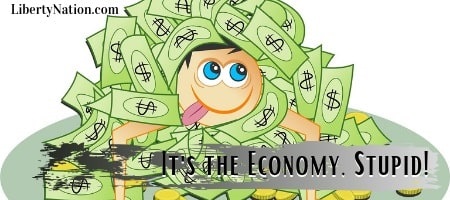Small business is the heartbeat of the United States, pumping life into the economy by employing half the labor force’s workers and cultivating thousands of communities nationwide. But the entrepreneurial spirit that defines America is now on life support. Millions of owners are at risk of losing everything they have worked for because the experts believe a one-size-fits-all nostrum of shutting down an entire economy over a nursing-home epidemic is the only way to combat the Coronavirus. Should the concept of small business become a relic of the good old days, future autopsies might reveal that the government, not COVID-19, was the real culprit in its demise.
Pendleton’s Pub and Pizza King
Zach Pendleton is one of the millions of entrepreneurs going through tremendous hardship. He and his wife, a nurse practitioner, opened Pendleton’s Pub and Pizza King in West Lebanon, IN – the only restaurant within 15 miles. Everything was going well for the business, incentivizing the 18-year Army bomb technician to invest more in his pub to make it “bigger and better.” Pendleton was living the American dream, but March 16 was the date his fortunes turned upside down. He was ordered to close.
Since then, he and his family have been doing everything to keep their heads above water.
“I’ve had to sell a tractor. I’ve had to sell a classic car, and just minuscule stuff in and around our house to be able to bridge the gap,” Pendleton said in an interview with Liberty Nation. “We had a little bit of savings in the bank to kind of float us through. I currently have two properties up for sale, and that’s just in anticipation of the repercussions and ramifications of this economy.”
Pendleton applied for the Paycheck Protection Program (PPP) loan and ensured he complied with all the rules and guidelines. But while he is grateful for the financial relief, it was difficult for Pendleton to learn that the funding was not retroactive upon receiving the money. For eight weeks, Pendleton had to tap into his savings and bring down his energy costs by shutting off the heat at a time when it was fairly cold in the Hoosier State. When he did receive the loan, Pendleton abided by the 75/25 rule: 75% was used to pay his dozen employees, and 25% covered his insurance, utility, and other business costs.
He is now hoping that he meets the requirements of PPP loan forgiveness, but considering the complexity and evolving metrics, Pendleton is unsure if he will qualify.
For now, it is about coping in a post-Coronavirus economy, which may prove to be as difficult as surviving the lockdown. With food costs just witnessing their biggest one-month pop since February 1974, restaurants will need to adjust their menu prices at a time when consumers are trying to catch up. Pendleton says it is hard for his $10 burger and fries to compete with a 99-cent cheeseburger from McDonald’s. For an industry famous for its razor-thin profit margin, the slightest increase in overhead costs can be the death knell for a food-service establishment.
However, if the recent acts of kindness in West Lebanon suggest anything, it could be that he may not need to worry too much about an uptick in prices. In a place of fewer than 1,000 people, Pendleton’s Pub and Pizza King is a mainstay in the town, and the community appreciates the establishment. In a symbolic act of rural charm, his loyal customers have done what they can to ease the pressure. Most of his customers are increasing their tips, while others are going as far as offering Pendleton money.
“They’ve been very, very great. I can speak volumes of how good the people have been to us,” he said.
“I hope we are able to rebound.”
Doom and Gloom
In recent weeks, studies have been released that highlight the damage inflicted upon small business. Even if the numbers were a quarter accurate, winter is coming for mom-and-pop shops.
According to a joint study conducted by economists at the University of Illinois, Harvard Business School, and the University of Chicago, more than 100,000 small businesses have permanently closed since the Coronavirus pandemic was declared in March. Hardest-hit have been restaurants as 3% of operators across the country have gone out of business.
A Society for Human Resource Management survey found that 52% of the more than 350 small businesses surveyed expect to shut their doors within the next six months. A recent Main Street America poll discovered that 7.5 million small businesses are at risk of shutting down in the coming months, and about half of those could shutter in just two months.
Harvard’s Opportunity Insights data show that revenues are down 40% nationwide. Some metro areas have it worse than others, led by New Orleans (83.8%), Washington (76.7%), and Boston (74.9%). If this persists, it will be difficult for these entities to keep the lights on and workers employed.
For small business owners who survive the public health crisis, the next major challenge will be new federal, state, and local regulations. A recent CNBC survey discovered that more than one-third of owners believe changes in government regulations will harm their operations over the next 12 months; just 20% say new red tape will have a positive effect.
It turns out that the trillions in government funding, from the PPP to the $1,200 cash injection, will not be enough to mitigate the pandemiconomy. The future of restaurants, bookstores, and clothing shops is uncertain as owners – and consumers – will need to make up for lost time. How they will navigate and adapt to the post-Coronavirus economy is unclear. Without the much-talked-about pent-up consumer demand and additional relief and stimulus from Congress and the Federal Reserve, every day is an eternal struggle.
The Future of Commerce
The consensus is that it will take Main Street several years to fully recover from this pandemic. Those deferred mortgage and rent payments need to be paid back. Investment and savings accounts need to be replenished. Governments need to tackle their massive budget gaps. As most of the economy concentrates on surviving until tomorrow, this could be an opportunity for multi-national corporations, online behemoths, and big-box stores to make their play.
What is the future of commerce? Until all get back on their feet, large cities and small towns could be flooded with McDonald’s locations, Starbucks coffee shops, CVS pharmacies, and Wal-Mart stores. Despite their internal difficulties, these companies are better positioned not to let a crisis go to waste.
 A lot of commercial and residential landlords have sympathized with their tenants. Even Starbucks is requesting a break on rent. But not every Los Angeles or New York property owner is as munificent, especially when a growing number of these landlords are unable to collect rent. Once they choose to evict a tenant over lack of payment, they will inevitably receive many applications to lease the space on the other side of the lockdown. Since landlords will do everything they can to recuperate their losses, they will give priority to established brands rather than risky newcomers.
A lot of commercial and residential landlords have sympathized with their tenants. Even Starbucks is requesting a break on rent. But not every Los Angeles or New York property owner is as munificent, especially when a growing number of these landlords are unable to collect rent. Once they choose to evict a tenant over lack of payment, they will inevitably receive many applications to lease the space on the other side of the lockdown. Since landlords will do everything they can to recuperate their losses, they will give priority to established brands rather than risky newcomers.
Put simply, even if entrepreneurs wished to start or reboot their independent operations, it could be difficult to overcome the biggest companies that are given higher urgency. This is bad news for communities that want to veer away from the corporate conformity of Domino’s Pizza, Target, and H&M, which populate many urban centers and small towns today.
The future of small business might be digital. The internet economy will be the new norm moving forward, and the online ecosystem may be the tool to resuscitate small businesses in America. But you cannot relax with a pint and pub food in a comfortable atmosphere on your computer.
The New Norm
Pendleton was leading a life that so many people dream of living. But a virus that may have prompted the government to overreact could decimate all his hard work and sacrifice and force him and his family to start from the beginning. Is the writing on the wall for others like Pendleton? The Coronavirus has permanently altered our reality, and from a market standpoint, that existence might be a run-of-the-mill Burger King and Dunkin’ on every street corner instead of a unique independent store or café that serves as a neighborhood’s identity.
~
Read more from Andrew Moran.
For home study students and young people, Liberty Nation recommends…
The Cost of Coronavirus
High School: How COVID-19 Has Impacted the US Economy
Middle School: The Economic Cost of COVID-19
All About the Government Response to Coronavirus
High School: White House Acts on Coronavirus
Middle School: Trump Takes Action on Coronavirus
Elementary School: Trump Versus Coronavirus
Watch Now
VIDEO: Why Do Free Markets Work?




